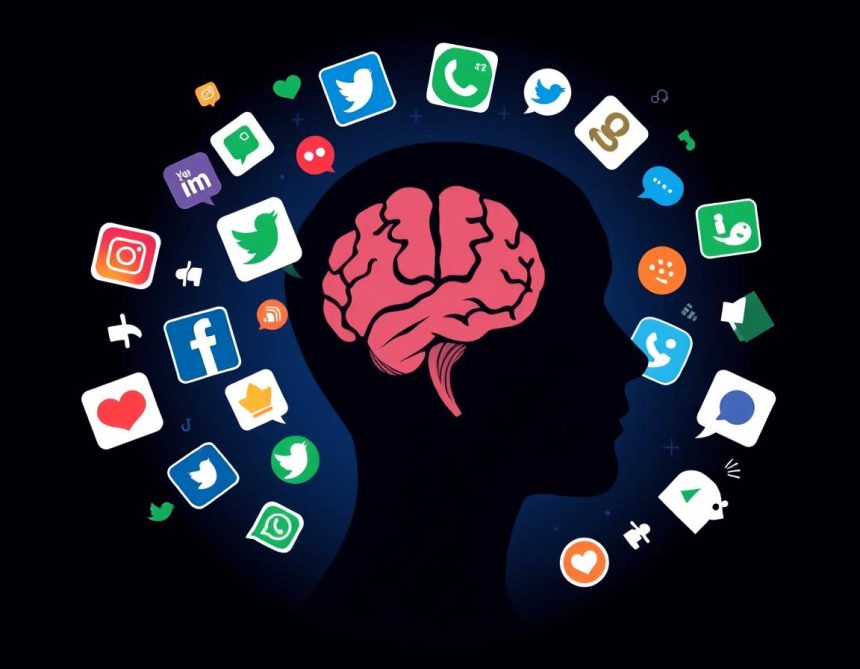Zara Wakil Machina
On a hot evening in Lagos, Ibrahim, a 21-year-old undergraduate, lies on his hostel bed, phone in hand, endlessly scrolling through TikTok.
His laughter echoes across the room as he watches comedy skits, music clips, and lifestyle vlogs. Yet, behind the laughter lies something heavier.
For every post that entertains, another sparks quiet comparisons: the friend flaunting a vacation abroad, the influencer showing off the latest sneakers, or the classmate who just secured a job. By the time Ibrahim puts his phone down, the laughter has faded, replaced with a nagging feeling of not being enough.
This scene is repeated daily across Nigeria. From Abuja to Port Harcourt, from bustling university hostels to quiet small-town homes, young Nigerians are living double lives: cheerful and connected online, but silently wrestling with the weight of social media’s pressures.
Social media platforms have undoubtedly connected Nigerian youths in unprecedented ways. They provide spaces for networking, entertainment, and even activism. Yet, these same platforms have also become mirrors that distort reality.
Studies reveal that Nigerian youths are among Africa’s heaviest social media users, spending close to four hours daily on apps like Instagram, TikTok, and Twitter. But what begins as harmless entertainment often leads to social comparison anxiety. Scrolling through endless highlight reels of peers, new clothes, new jobs, foreign trips, many begin to measure their worth against carefully curated feeds.
“It’s not just the pictures, ,” explains one cultural analyst. “It’s the silent message: you are not doing enough.” For many young people, that silent message is powerful enough to trigger stress, anxiety, and low self-esteem.
The psychological toll is staggering. A 2020 study among Nigerian university students found that one in three showed signs of moderate-to-severe psychological distress. Another 20 per cent displayed behaviours linked to internet addiction. Beyond academic struggles, many reported sleep problems, irritability, and persistent anxiety, all tied to excessive online activity.
Doctors also warn that the rise of cyberbullying and online harassment worsens the problem. For some, the phone has become both companion and tormentor: the source of connection, but also the source of constant self-doubt.
Ironically, while social media promises connection, many youths feel lonelier than ever. Likes and comments offer temporary validation, but rarely replace genuine human interaction.
The “always online” culture leaves little room for silence or reflection. Even moments of rest are interrupted by notifications—WhatsApp groups buzzing, Instagram reels autoplaying, TikTok challenges demanding attention. In this overstimulated world, the mind has little chance to breathe.
Mental health challenges among Nigerian youths go beyond the screen. Economic realities, unemployment, inflation, and the high cost of living, add to the strain. For some, social media only magnifies these struggles, as they constantly compare their circumstances with those who appear to have “made it.”
Yet, unlike in many parts of the world, mental health remains a taboo subject here. In many Nigerian homes, depression is dismissed as laziness, and anxiety is explained away as “overthinking.” Professional care is scarce, Nigeria has fewer than 300 psychiatrists for over 200 million people. This gap leaves most young people to cope silently, masking pain behind memes, banter, and curated online smiles.
Despite its risks, social media also offers a lifeline. Online communities have begun breaking the silence, with young Nigerians using platforms to share personal stories, create awareness campaigns, and provide peer support. Mental health organisations, though few, are increasingly using Instagram and Twitter to reach younger audiences where they spend the most time.
This duality, social media as both problem and solution, defines the youth mental health story in Nigeria today. Experts argue that the solution is not to abandon social media but to build healthier habits. Simple steps such as digital hygiene (no-screen hours), media literacy campaigns, and school-based awareness programs could help. More importantly, society must shift from silence to openness—talking about mental health not as weakness, but as part of everyday wellness.
For Nigerian youth, mental health is now inseparable from digital life. The same phone that delivers joy can also deliver silent despair. The same apps that build community can also breed comparison and loneliness.
But recognising this struggle is the first step toward change. If Nigeria is to protect its future generation, conversations about mental health must move beyond whispers. And in that journey, perhaps social media itself can become more than a mirror of comparison; maybe, with care, it can become a tool for healing.
ALSO READ TOP STORIES FROM NIGERIAN TRIBUNE
WATCH TOP VIDEOS FROM NIGERIAN TRIBUNE TV
- Relationship Hangout: Public vs Private Proposals – Which Truly Wins in Love?
- “No” Is a Complete Sentence: Why You Should Stop Feeling Guilty
- Relationship Hangout: Friendship Talk 2025 – How to Be a Good Friend & Big Questions on Friendship
- Police Overpower Armed Robbers in Ibadan After Fierce Struggle






